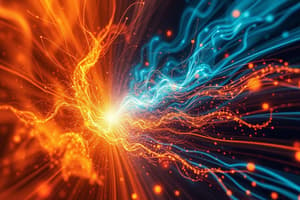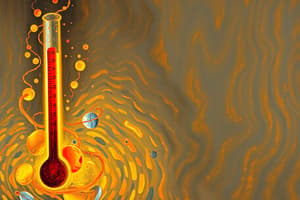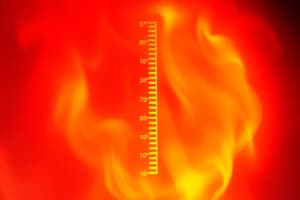Podcast
Questions and Answers
At a given temperature, do all particles in a beaker have the same amount of energy?
At a given temperature, do all particles in a beaker have the same amount of energy?
- Yes, they all have the same amount of energy.
- No, they only have different energies during boiling.
- No, not all particles have the same kinetic energy. (correct)
- Yes, they have different energies due to evaporation.
What is vapor pressure and why must it be measured in a closed container?
What is vapor pressure and why must it be measured in a closed container?
- Pressure generated by a vapor in equilibrium; measured to prevent leaks.
- Pressure generated by a vapor in equilibrium; measured to avoid interference from outside factors. (correct)
- Pressure generated by a liquid in equilibrium; measured for safety reasons.
- Pressure generated by a liquid in equilibrium; measured to prevent contamination.
How does evaporation affect the temperature of a liquid?
How does evaporation affect the temperature of a liquid?
- It lowers the temperature by decreasing kinetic energy of remaining molecules. (correct)
- It increases the temperature due to higher kinetic energy of escaping molecules.
- It has no effect on temperature.
- It increases the temperature by releasing heat energy.
What is the effect of increasing temperature on the vapor pressure of a liquid?
What is the effect of increasing temperature on the vapor pressure of a liquid?
Why does the boiling point of a liquid vary with atmospheric pressure?
Why does the boiling point of a liquid vary with atmospheric pressure?
What are IMF's and which state of matter has the strongest intermolecular forces?
What are IMF's and which state of matter has the strongest intermolecular forces?




